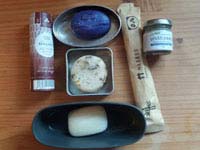
July is the Marine Conservation Society’s “Plastic Challenge” month – when your mission, if you chose to accept it, was to try to go a whole month free of the evils of SUPs. In a 21st century consumerist world, that is a challenge indeed.
“What’s wrong with Stand-Up Paddleboards?” you may ask. Well, nothing at all of course (ask Niki from the Nature Travels team – she’s often to be found on a SUP around the Dorset coast). No, here we’re talking a different beast entirely: Single Use Plastics.
Single Use Plastics are a scourge. A recent report by the Ellen Macarthur Foundation concluded that, if the current rate of increase in plastic production continues unchecked, there will be more plastic (by weight) than fish in the ocean by 2050. Currently around 8 million tonnes (that’s a garbage truck per minute) finds its way into our oceans.
But finally, after decades of mindlessly throwing away millions of tonnes of the stuff (though of course the irony is there’s no “away” – everything we’ve ever made will be around pretty much forever), it seems that this is a movement whose time has finally come. Thanks in part to the popularity of the Blue Planet series, the profile and momentum of this issue is rising every day and perhaps the tide will soon be turning.
Nature Travels has been supporting the Marine Conservation Society since 2016. Since 2017 this has been with a particular focus on the important issue of reducing plastic waste.
Travel is certainly one area where a lot more plastic gets used than it should, and personal hygiene is a particular culprit here as it is in everyday life. So with this mind, we have some suggestions to make your wash bag plastic-free on your next trip (and of course also for every other day of the year!):
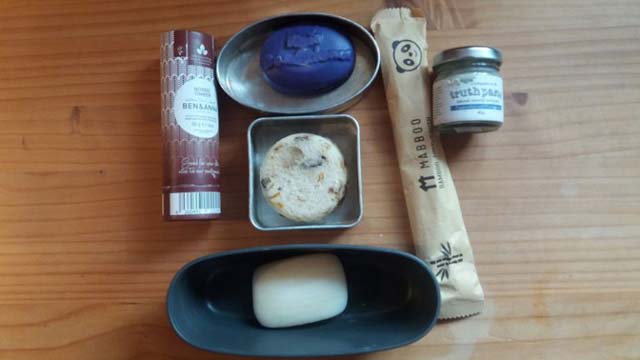
Soap and Shampoo
Even a 40-something youngster like myself remembers a time when there was no such thing in your average person’s bathroom as “shower gel”. How did companies manage to convince us that we need to buy all this pointless stuff in plastic bottles?
Why not try:
Faith in Nature soap bars: We’ve tried a few different soap bars, and did find some of them a bit drying, but we like the Faith in Nature ones. They’re available from most health stores or from www.faithinnature.co.uk . Depending on where you buy, they may still come lightly wrapped in plastic, but it’s still a fraction of the packaging of shower gel. However, many health stores now sell them unwrapped, which is of course a much better option. Get a metal container (e.g. from Lush – see below) to store your chosen soap bar for travelling and you’re all set. Think of all those plastic sachets from hotel rooms you won’t need to steal now!
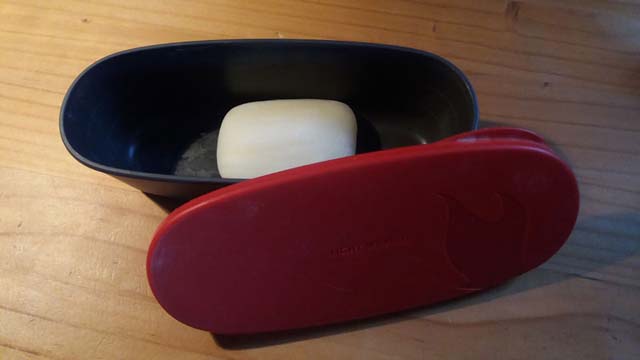
Lush Shampoo and Conditioner bars: Did you know that, before the early 20th century, there was really no such thing as shampoo at all? People washed their hair with soap, though of course these days we’ve been cunningly convinced that our hair is in mortal danger without it. But if you’d like to go plastic-free for your hair-care needs, there are surprisingly few (so far) products out there. We’ve found the Lush shampoo bars pretty good – they wash well, smell nice, and although a bar is expensive-ish (about £6.50) compared to a “normal” bottle of shampoo, they last a very long time. The only reservation we have is don’t leave your shampoo bar in a very hot tent, because ours melted – although, to their credit, Lush sent us a free replacement immediately when we mentioned this to them. The conditioner bar has been fine. Again, kept in a tin they’re great for travelling.
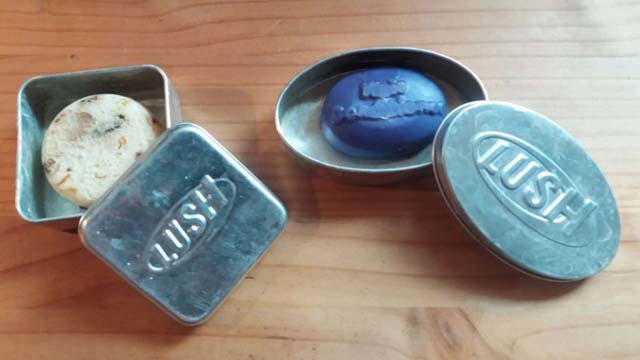
Love Lula Shampoo bars and the No Plastic Shop: We also recently received a recommendation from one of our guests, Rachel Wijsmuller, for Love Lula argan oil and mint shampoo bars. Rachel also recommends the No Plastic Shop as a great resource for plastic-free shopping, including toiletries. Thanks for the tips, Rachel!
A Storage Tin: You’ll need something to keep your soap, shampoo and conditioner in, of course. Tupperware-style containers work just fine, but you might also like a snazzy tin! Lush do some.
Toothpaste and Toothbrushes
Truthpaste: At the moment, the possibilities for going plastic-free for dental care are very limited indeed. Even most “natural” toothpastes come in plastic tubes. But an option we like is “Truthpaste” – not that easy to find, but available from some health stores as well as online from www.truthpaste.co.uk It’s a clay-based toothpaste that comes in a glass jar. It tastes fine (different from a “normal” toothpaste of course as it doesn’t have all the flavour additives – you’ll get used to it), leaves your teeth feeling clean, and again, although is fairly high-priced does last a long time, which offsets the higher initial cost. If you want a more traditional-tasting toothpaste, Euthymol has been around since 1898 and is a partial plastic-reduced solution available from many supermarkets – it comes in a metal tube, though will still have plastic cap. If you particularly want a toothpaste containing flouride, though, we haven’t yet found a plastic-free alternative.
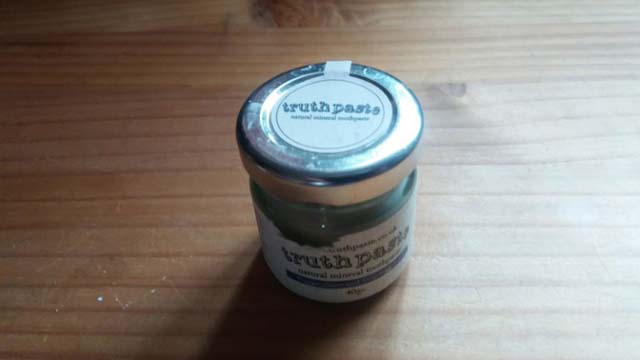
Wooden toothbrushes: There are a number of options for wooden-handled toothbrushes out there. Though some may still have nylon bristles (or in the case of the Mabboo brush below, “bamboo-infused nylon”!), they nevertheless use a fraction of the plastic of a “normal” toothbrush. When you choose, make sure the bristles are stiff enough for you, as a couple of brands we’ve tried were very soft. One make we saw even came wrapped in a lot of hard plastic packaging, which seems a bit odd! Most come in cardboard or paper packaging (like the unopened brush from Mabboo shown below), which makes much more sense – see mabboo.com
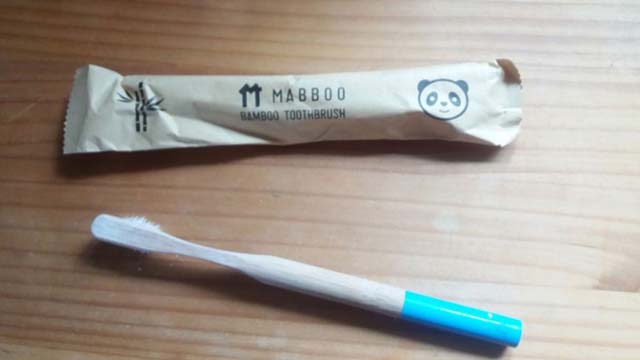
Deodorant
Ben & Anna deodorant: When you’re getting set for an active day’s dog sledding in the mountains or sea kayaking among archipelago islands, you probably want a good deodorant. Again, so far, the options for going plastic-free are extremely limited. The ones we’ve found are from Ben & Anna, which come in a cardboard tube. They smell nice and, unlike one or two other “natural” deodorants we tried, seem to do their job very well. The downsides are the high cost (about £8 a tube, though again they last quite a while and also multi-buy online discounts are available) and that, like the Lush shampoo bar, they go a little mushy if left in a hot tent. But definitely worth a try. See www.ben-anna.com
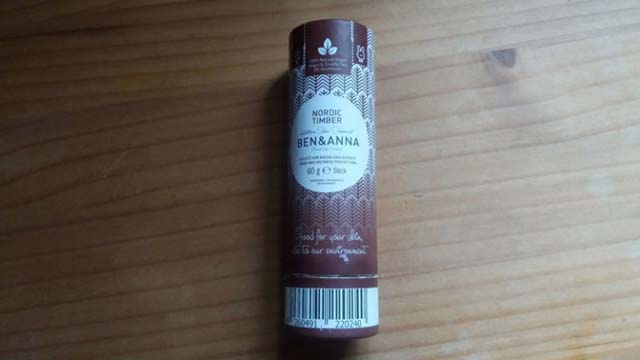
For the basics outlined above, there’s no reason at all, with just a tiny bit of effort next time you shop, why your toiletry bag on your next travel adventure can’t be at least mostly plastic-free – which has to be better than a wash bag full of plastic bottles and tubes.
The plastic-free revolution is just beginning, and I think there’s certainly scope for a much wider range of solutions in this area as well as for more robust and competitively-priced products to help bring plastic-free shopping into the mainstream. But if consumers demand more plastic-free products, they will appear!
We’d love to hear from you with your own suggestions for eliminating or reducing plastic on your travels! Get in touch with via the Nature Travels Facebook page or tag us in an Instagram picture (@naturetravelsltd) of your favourite product “in action” from your trip!
For tips on reducing your plastic consumption and to find out more about the Marine Conservation Society’s campaigns, please see https://www.mcsuk.org/
Best regards
Bob from the Nature Travels team
